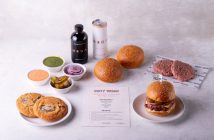“You all look too thin to be serious eaters,” said Matthew, as we took our seats around a large table at Bentley’s Oyster Bar & Grill. “It’s the fear of the encroaching spare tyre that keeps us slim,” replied Lawrence, but Matthew was not impressed. “You need to embrace your spare tyre,” he said. “It’s the inevitable consequence of a well spent youth.”
Matthew Fort needs no introduction; a clichéd statement which of course means that I am about to introduce him. Readers will know Matthew as a judge on the popular BBC television series, Great British Menu, while others will recall the fifteen years he spent as Food & Drink Editor of The Guardian, not to mention the award-winning books he’s written and all the restaurant reviews that have advised you whether or not to spend your hard-earned pennies at an overhyped eatery or a little-known backstreet gem. But perhaps the best way to sum up the totality that is Matthew Fort is to quote the culinary powerhouse of Marcus Wareing, who said to me in an interview: “Matthew Fort knows more about food than most chefs.” I rest my case.
Having danced around the fact that the three Arbuteers are suspiciously thin for people labelling themselves as gluttons, Stirling went on to admit – for reasons unknown – that he had just given up coffee. Matthew wasn’t overly enthralled by this revelation either. I began to wonder if he would leave the restaurant before we’d even been offered bread. “I buy my coffee beans from Markus on Connaught Street,” he said, “a shop that’s been there forever and ever. They roast onsite, do everything in small quantities. They send me kilo bags of beans and I grind them whenever I make coffee in my stove-top espresso. But I’ve just got a new kitchen with an induction hob, and the espresso doesn’t work on it.”
A man who grinds his own coffee from gourmet beans and fits his kitchen with a professional Falcon induction cooker, is serious about food. And not just eating it. As our starters arrived – herring on toast for Matthew and an almost laughably huge shellfish cocktail for yours truly – talk turned to Matthew’s food heritage. “I have three brothers and a sister, and we all inherited what I call the greedy gene from our father, who was an immensely greedy man. Food was part and parcel of where we grew up; we had a kitchen garden, the veg was fresh, the fruit was fresh and the food, wine and conversation were an integral part of our upbringing.”
The notable difference between Matthew and many other food critics is that he actually knows how to cook and does so regularly and with relish (or chutney), leading to a much deeper understanding of the dishes that he eats when dining out. “When I was at university I started cooking for myself, and I realised it was a good way to keep friends. I’d been jilted by a young woman and I became the most boring person to be around, because I felt as if nobody had suffered as much as I had. So the only way to tempt my friends back was through cooking. But I think the real reason why people cook is because they’re failed actors. We just love the applause, the moment when people ask for a second helping.”
Richard Corrigan of Bentley’s made a brief appearance at this point – Matthew and Richard had been filming together the day before on a BBC series called Great British Waste Menu – and once Corrigan had left the room, after personally serving us vegetables, we started talking about what it takes to become a successful chef.
“Chefs are not necessarily the most articulate people in the world, and food becomes a communication tool for them. Most of the successful chefs are incredibly driven and competitive, as if in other circumstances they might have become the best hedge fund managers in the world. It’s just that food happens to be the channel for that degree of energy and focus. There are not many for whom food is a primary means of expression. For someone like Richard Corrigan or Rowley Leigh, food to them is like music was to Mozart, a form of expression. Or take Heston Blumenthal as an example; here’s a man who left school with five O-levels and now lectures Nobel Prize winners on the physics of cooking. It’s about someone finding their language.”
The experience of eating is ultimately about happiness, and as I chomped through one of the best shellfish cocktails I’ve ever had, we discussed the subject of writing about food and the dark art of restaurant criticism. “Restaurant critics often forget that people want to go out to have a good time. You have some restaurants that have been going for decades, and despite bashings from the likes of Rayner and AA Gill, they keep going back, because they deliver a particular kind of experience that people want to have.
“When they do independent research into why people visit restaurants, food is normally only about fifth on the list of priorities; price, service, ambience and convenience, all come first. Different restaurants have different functions. You do not go for a romantic night out with your partner to the same place that you’d go to for a knees-up with your rugby mates.”
As I tucked into my main course of Royal Fish Pie, wondering if I had shrunk or if this really was as big as it looked, I asked Matthew about his writing career and what path he took to become a columnist with the Financial Times, his first food writing job. “As a writer I’ve had the great fortune of starting my career in advertising. I worked in advertising for 20 years. And that was brilliant training for all sorts of journalism, because no one wakes up in the morning and looks forward to reading ads. So you have point-five of a nanosecond to stop someone in their tracks with a headline that they probably don’t want to read anyway. You spend a lot of time thinking about what is the potential customers’ point of view about this, what do they want to hear?
“I think that’s also true of restaurant criticism and food journalism. Bear in mind that someone is paying money to read what you’ve written. I’ve always felt a responsibility to the reader to provide them with information so they can make decisions on their own back. If you review restaurants for any length of time you develop a relationship with your readership. They get to know your strengths and weaknesses; if it’s got offal on the menu, we know Matthew will go straight for the offal. I see restaurant reviewing not as entertainment – which is what Adrian Gill does, an entirely justifiable point on the critical spectrum and he does it better than anyone else – but rather my job is to give the reader as much information as possible in an entertaining way so that they can decide whether to go to the restaurant or not, and secondly to give my judgement about the restaurant in relation to its own set of criteria.”
Food, happiness and memory are so integral that people often overlook the true value of a good meal in favour of Michelin-stars and chef accolades, but some of Matthew’s most delightful dining experiences have occurred in the most unlikely of places. “A publication covering the best restaurants in the world used to canvass my opinion, and one of the restaurants I would always push was a place called Dorego’s in a tiny little dorp called Hamburg in the Eastern Cape of South Africa, situated in a beautiful estuary, serving Peri Peri chicken, Peri Peri fish, local oysters, salad, soggy chips, one of those places with a pool table in the middle of the room. It’s so much of itself, so genuine, and it’s quite wonderful. Food is about memory; you can have the most beautiful modern food cooked on the face of God’s earth, but if you are there saying to the person across the table, “I’m terribly sorry but we can’t live together anymore”, it’s going to be ashes in the mouth. Whereas it could be a Shepherd’s Pie and a Bulgarian merlot with friends and family, your children clambering around your feet, and you will remember it forever.”
Having almost passed out while attempting to finish the gigantic fish pie in front of me, desserts were then ordered – something with chocolate for me – at this stage all that mattered was that I finished it and didn’t embarrass myself in front of Matthew by leaving anything on the plate, talk turned to the foodie nation’s favourite TV show, Great British Menu, on which Matthew has the excruciating task of eating dish after dish cooked by some of the country’s finest chefs.
“The great thing about Great British Menu so far as food programmes on television are concerned, is that it completely changed the template. The first one was commissioned as a one-off, and suddenly the viewing figures for 6.30pm started to go sky-high and on the basis of that they commissioned another one, and so on. And it’s maintained that audience.
“One of the extraordinary things about food on television is that the viewer cannot share in the critical experience of tasting the food, therefore it’s incumbent upon the presenter to find a form of language which describes what the flavours are like, but also the effect of the dish, a description that encapsulates what one is eating. That’s something that I work at very hard and so do Oliver and Prue.”
As we sipped on 20-year-old Armagnac, our sated stomachs slowly digesting the remnants of a gloriously decadent meal (and yes, I did finish my dessert), Matthew gave us one final musing – the Gospel According to Saint Fort – which says that it doesn’t matter how you approach food, so long as you enjoy it.
“I used to be very purist and rigorous about food, thinking that everyone should share my own particularly high-minded ethical gourmandising, but in the end I came to the conclusion that it really doesn’t matter how people come to food, as long as they come to it. For a large number of people, good food is like an extension of themselves, as much as a Prada handbag. It’s a fashion statement, and that doesn’t matter, as long as it leads to a greater understanding and to eating things they wouldn’t otherwise do.”
We rolled our spare tyres out of the restaurant into a late summer’s afternoon, dazed and slightly befuddled from the Armagnac, and waltzed back to our respective places of rest for some postprandial sheep-counting. And the moral of this story? Good company makes a great meal, so be careful who you dine with. And don’t worry about the spare tyre.
Matthew now has his own website packed with glorious unabashed gourmandising, which can be found here. You can also follow Matthew on Twitter.




